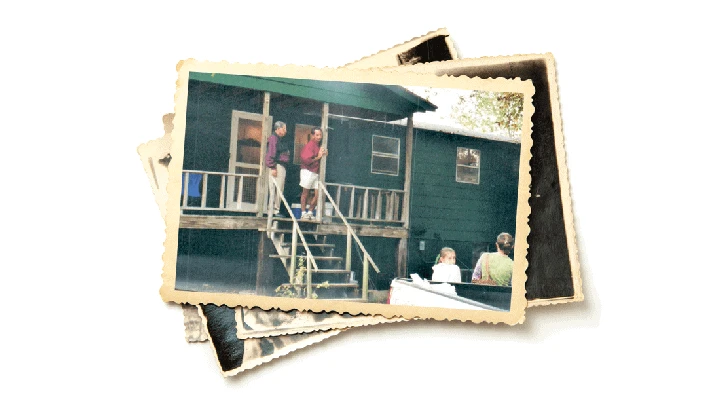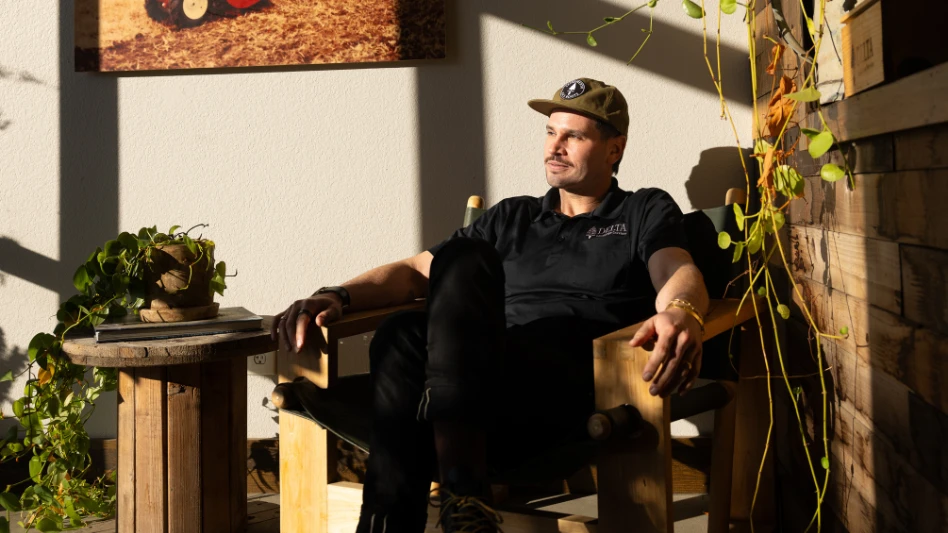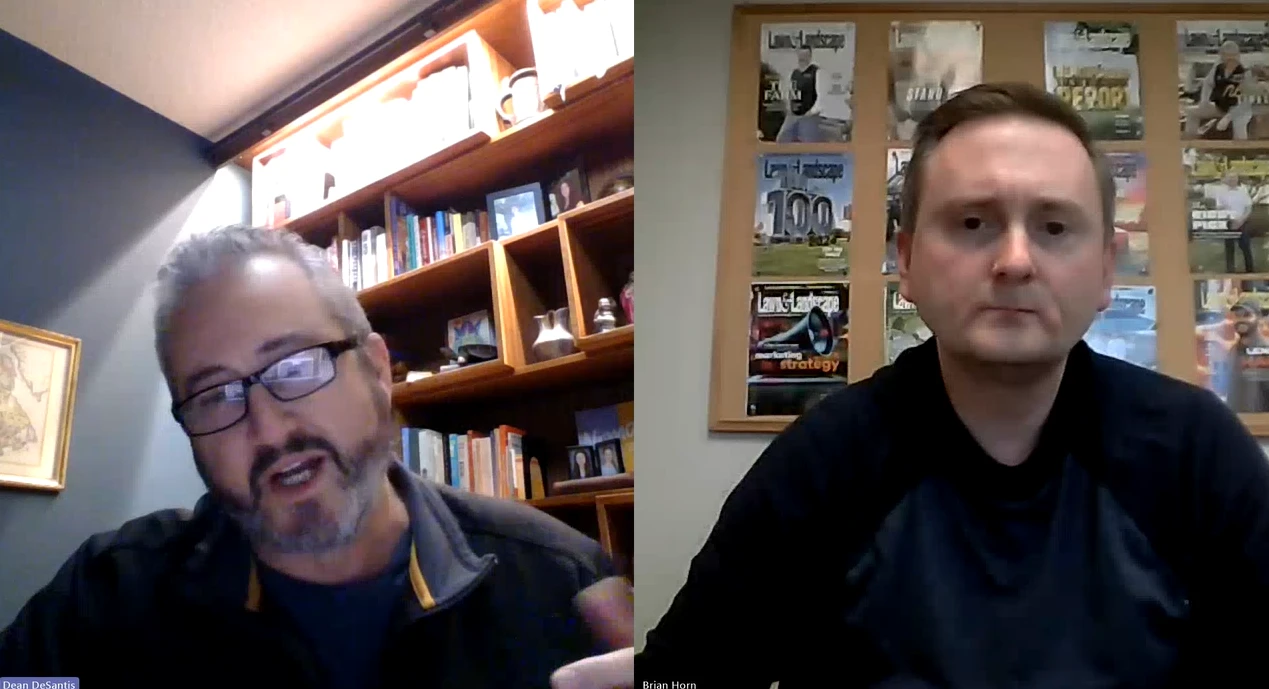

Andy Kadrich, founder and CEO, started Turf Masters in his basement in 2002. Since then, the company has grown to include 11 branch locations in four states.
For Kadrich, setting high goals for the company contributes to its success. In 2019, the company budgeted $15 million in revenue and increased it to $19 million for 2020.
Turf Masters finished out the year just over $20 million, and projections for 2021 are north of $24 million.
Kadrich says the company reaches these high goals by what he calls “boots on the ground” or going door-to-door. Strong advertising and branding also play a large role.
Keep evolving.
Kadrich says success is all about making the necessary adjustments. He adds there were a few changes in 2019 that helped Turf Masters get closer to their goal.
“It was an adjustment year,” he says. “We used to hire salespeople from any industry. We made the decision to hire only from within our industry. They seem to last a bit longer and we get better sales. In this hiring environment, it’s already very difficult. It can be even tougher when you limit it to just this industry, but we made that commitment.”
And the move paid off. Kadrich says they have less turnover and more sales now.
Because the salespeople he’s hiring are veterans of the industry, Kadrich says he’s willing to pay a little more. “We traditionally pay team members more than normal as they have experience and are married to the industry thus, they don't leave as frequently,” he says.
While Turf Masters uses traditional hiring platforms like LinkedIn and Indeed, Kadrich says having a recruiter that’s plugged into the industry is also a major benefit.
Kadrich says another adjustment that bolstered the company’s bottom line was only taking on new customers who prepaid or put a credit card on file for auto-payments.
“We left our current customer base the way it was,” Kadrich says. “But through email, and the way we delivered the bill, we tried to move them toward this. It wasn’t mandatory, but they no longer got an invoice on the door that they could mail in. They got a card on the door that explained what we did and showed them how to pay the bill online.”
Kadrich says having customers on auto-payments helped in a few ways.
“Our bad debts were cut in half, but we didn’t really have a bad debt problem,” he says. “It also lowered our new sale cancellation rate down to about 13%.”
Kadrich adds that auto-payments also help keep customers on a better schedule.
“Service to our customers improved quite a bit,” Kadrich says. “The key to our service is keeping customers on time and on schedule with their applications. So, if someone waited 60 days to pay, that puts your program off kilter.”
Kadrich says Turf Masters has continued to strengthen internally as well.
“Our big commitment this year was to reinvent our training program, which we did at the end of 2019 and implemented in 2020,” Kadrich says. “We made the training program for salespeople into a three-month program. It’s structured so that everyone goes through the same thing and we can hold people accountable for making sure they’ve successfully gone through the program. There’s testing that goes on and the manager can look at a new hire and see where they’re at with the testing.”
The company has also recently brought on an operating system director, who has become the go-to person for all the operating systems and has helped streamline operations.
“As we get bigger, one of the things we always say is, ‘if you’re not changing, you’re dying’” he says. “As we get bigger, we’ve got to get better, so that we keep the same values we had when we were working in my basement 17 years ago.”
Finding the right fit.
When it comes to hiring, Kadrich says the best thing companies can do is look internally first.
“We feel it’s our responsibility to provide an environment where our employees can grow within the organization,” he says. “From a business standpoint, it just makes sense. We’ve hired from outside, but when you do that, you’re relying on an interview process. It could be five interviews, but you can still only get so much out of these interviews. When you promote from within, you’ve got someone you’ve worked with for 5, 10 or 15 years. You know everything about that person.”
Kadrich adds that this also helps to boost morale.
“Other employees have to see hope, they have to see there’s opportunities down the road,” he says. “Having that hope creates a culture where people work harder. When it comes to taking care of your employees, it means growing your business, so that you’re creating opportunities for your employees all the time. If they don’t have opportunities, then what are you doing?”
Kadrich says that all openings are first posted within the company and everyone who applies is interviewed by the branch manager, president and CEO. While co-workers are competing for the same promotions, Kadrich says Turf Masters’ process can help everyone in the long run.
“There are times when you have to tell somebody, ‘no, you aren’t getting the position,’” he says. “But… it gives us an opportunity to build a plan for them going forward on how to accomplish the goals that they want to. Sometimes they don’t get promoted at that point, but we have a succession plan to get them where they want to be. It’s monitored by me all the way down to their direct manager.”
While filling a role internally may not always be possible, Kadrich says making sure your team has the skills to recruit the best is also vital in the hiring process.
“I took a more active role in recruiting when we were a younger company and doing a lot of it, but as we got bigger, we moved a sales manager into a recruiting role,” Kadrich says. “He teaches our branch managers how to be better recruiters and he teaches our other management as well. We’ve got a really good hold on our recruiting now. A lot of people are taking notice of Turf Masters around the country. They’re seeing our company grow and hearing about our culture.”
One way to improve your recruitment process is to never stop it, he says.
“If you are 100% staffed, still recruit. It doesn’t mean you hire them right away, but building these relationships and having them on the bench is a great way to go,” he says.
Kadrich also suggests that businesses looking to hire diversify their search and not pigeonhole themselves to one job posting site or one recruiting strategy.
“Don’t just count on one thing. There are so many different things out there,” he says.
Culture is key.
Kadrich says making sure your company has a reputable culture is also beneficial, not only for recruiting but for growth as well.
“Without our culture, we certainly wouldn’t grow at the rate we’re growing,” he says. “It’s a cliché and you hear a lot of people say, ‘we work as a team,’ but people who come into our company see it and say, ‘the culture here is so positive.’ It’s a little laid back but yet very aggressive. We all work very well together.”
Kadrich says the positive culture is built around a favorable work/life balance.
“I want to have a company that takes care of its customers like nobody else and takes care of its employees by having a work/life balance,” he says. “We try to provide a work/life balance that works for us and works for the employee, so we have less turnover.”
Kadrich says shortening the work week has helped promote this. Crews put in 40 hours Monday through Friday.
“When you drive around in our markets…you will not see Turf Masters’ trucks on the road on Saturdays,” he says. “Saturdays are unacceptable, 40 hours is the maximum work week. From a recruiting standpoint, this gives us an advantage.”
The culture at Turf Masters is also based upon the company’s vision and it’s been at the forefront of everything since the beginning.

“Our vision is essentially the same as it’s always been,” Kadrich says. “It’s three basic things – take care of your customers, take care of your employees and when you make mistakes (whether it’s with a customer or a peer) do the right thing and fix it. It seems so simple, but it means a lot. If we don’t do this, then we’ve lost everything we’re supposed to be doing.”
Kadrich adds having that vision so integrated into the company keeps everyone on the same page.
“Before any meeting is ever started, whether it’s a conference call or manager’s meeting, somebody has to read that vision,” he says. “If you go through our company, everyone can recite that vision. It’s really what keeps our culture the way it is.”
A vision, according to Kadrich, is the foundation of a success.
“I think every company should have one,” he says. “I talk to a lot of business owners and all the successful ones have a vision.”
Kadrich suggests business owners who don’t already have a vision establish one. He says start with your goals and values and build up from there.
Branching out.
While growth is key, Kadrich says maintaining quality service has to stay a priority.
“As we grow, the worse thing I could hear is that we lost our values,” he says. “That is a challenge I take on every day, so that we don’t lose our culture or our vision. I want to maintain that we’re the same company we’ve always been, just bigger.”
Currently, Turf Masters has 11 branches across Georgia, Alabama, South Carolina and Tennessee. Kadrich says he hopes to continue adding to this list.
“We’re looking at Chattanooga and opening another location in Nashville,” Kadrich says. “We’re also looking at Charlotte, Memphis and a lot of different markets.”
Turf Masters had another opportunity for growth when it acquired Dorsey Services, of Jackson, Ga., in 2015.
Kadrich warns that before companies make an acquisition, they should ensure it’s the right move.
“The only way I will buy a company is if they have great service,” he says. “Then, I feel that all I have to do is implement my marketing plan and the company will pay for itself.”
“Other employees have to see hope, they have to see there’s opportunities down the road.” Andy Kadrich, founder and CEO of Turf Masters
In order to determine if a company has great service, Kadrich suggests looking at cancellation rates, the tenure of employees, the facility, the equipment and customers’ lawns.
Kadrich says his acquisition of Dorsey Services checked all the right boxes.
“In all the years I’ve been in lawn care, this has been the best acquisition I’ve ever seen,” he says. “We didn’t lose employees; the employees saw more opportunities and they got paid more. From a financial standpoint, a company has to pay for itself. I have to make an investment to buy it, but it has to pay me back. Dorsey Services has paid me back and we’ve already doubled the revenue. The value is double what it was.”
While the acquisition was successful, Kadrich says he isn’t overly eager to take over another company.
“We’ve looked at other companies, but if they don’t have the great service, we pass on them,” he says. “We like looking at companies in emerging markets that we want to go into. We’re very selective.”
Navigating COVID-19.
Despite the coronavirus pandemic impacting landscaping companies across the nation in 2020, Kadrich says his company did its best to weather the storm.
Kadrich says Turf Masters took sanitation and social distancing seriously by putting new measures in place.
“We implemented staggered starts for all technicians where they do not come into the office unless to use the restroom. Everything is ready for them in the truck in the morning and they leave everything in the truck in the evening, which is picked up by a manager,” he says. “Some of these processes we’ve implemented will stay with us forever because they make us more efficient.”
Kadrich says that despite all the safety measures in place, some employees still contracted COVID-19.
“We had a situation where three folks in our customer care center were diagnosed with COVID-19,” he says. “They were quarantined for two weeks. We then took our office people and set them up to work from home.”
However, even during these tough times, Kadrich says sales have still been going up.
“Everybody was home and what do people do when they’re home? They stand outside and stare at their weeds,” he says. “We made more sales.”
Kadrich adds a serendipitous marketing approach also helped bring in more customers.
“The other thing people do is watch T.V. Coincidentally, we made the decision to do a fairly large T.V. campaign,” he says. “It started right when COVID-19 did. The timing was perfect.”
And sales continued to go up throughout the year.
“In 2020, we grew by 27% which I would say is great during a pandemic, or any other year for that matter, and our retention rate actually improved in 2020 by a point,” Kadrich says.

Explore the April 2021 Issue
Check out more from this issue and find your next story to read.
Latest from Lawn & Landscape
- Wilson360 adds Daniel Grange as new consultant
- Batman and business
- CH Products releases new tree stabilizer
- Savannah Bananas founder Jesse Cole to speak at Equip Exposition
- Catch up on last year's Benchmarking report
- Davey Tree promotes Kevin Marks as VP of Western operations
- Bobcat Company names 2025 Dealer Leadership Groups
- Green Lawn Fertilizing/Green Pest Solutions awards employee new truck for safe driving





